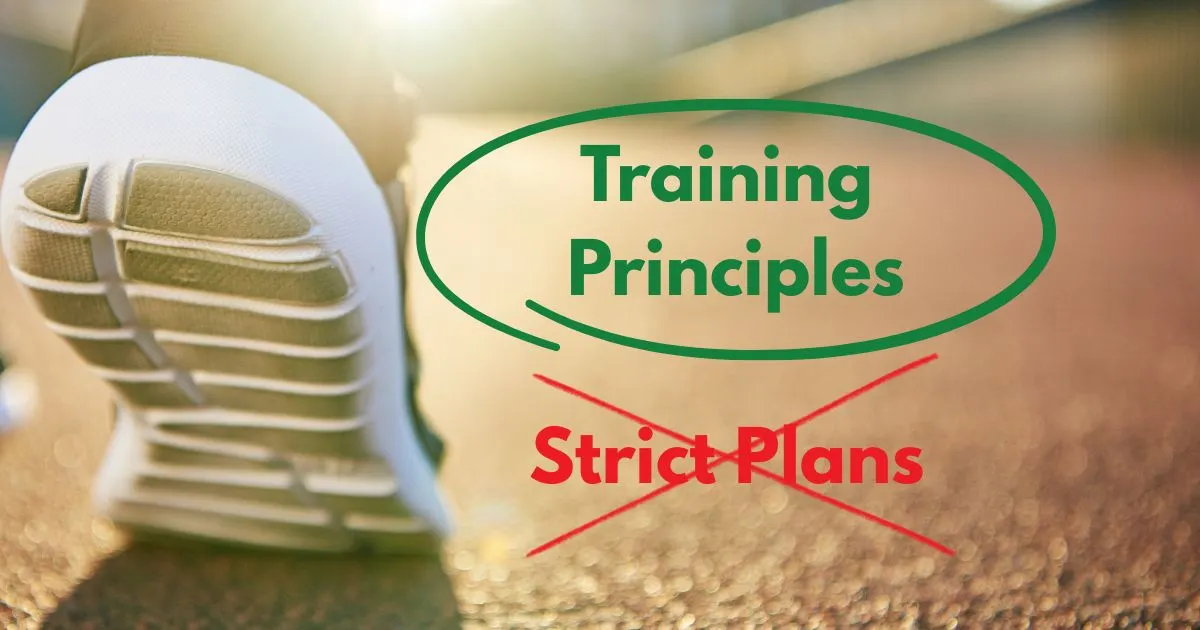All well-designed training plans follow key training principles that ensure a great marathon result. Here they are.
The decision was done. Race day is on May 16. It’s time to start training.
There are countless of pre-defined marathon plans on the internet, but they demand pretty strict adherence.
That doesn’t work for me: not for my personality, and not for my life with a 1-year old toddler and other responsibilities.
So how do you do train when you need a flexible approach that adapts to whatever life throws at you?
Philosophically, I’m a big fan of principles over rules. Rules are strict and rigid. Principle are a guiding force, they’re adaptable by nature.
With my preference for principles, I looked at what all well-designed marathon plans have in common. Those are the universal training principles that actually matter, and here they are:
P.s. these purposefully leave out nutrition, even though it’s a critical part of succesfull training and racing. It’s a topic that warrants it’s own post(s), so more on that later.
The Marathon Training Principles
Build Your Foundation
1. Build Your Aerobic Engine (80% Easy Running)
- What: Run 80% of your weekly miles at conversational pace where you can nose-breathe comfortably
- Why: Aerobic fitness is the foundation of marathon performance. Easy running builds mitochondria, capillaries, and fat-burning capacity without breaking you down
2. Consistency Beats Heroic Efforts
- What: Multiple shorter sessions per week (running, strength, drills, mobility) beats infrequent epic efforts. Aim for 3-5 runs plus 2 strength sessions plus daily mobility, rather than occasional crushing workouts
- Why: Frequent, manageable training stimulates adaptation without overwhelming your body. Two 8 km (5-mile) runs build more fitness than one 16 km (10-miler). Daily 10-minute mobility beats occasional 90-minute yoga marathons. Your body adapts to consistent patterns - missing one session doesn’t derail you, but inconsistent weeks do
3. Increase Gradually, Not Recklessly
- What: Add ~10% weekly distance or 3 - 5 km (2-3 miles) when you feel ready. Include an easier week every 3-4 weeks. Same principle applies to strength training and mobility work.
- Why: Progressive overload is the universal training principle across all physical adaptation. Your tendons, ligaments, bones, and muscles all adapt slowly. Rushing volume or intensity is the #1 cause of overuse injuries. Gradual progression is sustainable and makes you stronger.
4. Progressive Long Runs Build Confidence
- What: One longer run per week, starting comfortable and adding 2 - 3 km (1-2 miles) when manageable. Peak at 28 - 35 km (18-22 miles)
- Why: Builds endurance, mental toughness, and teaches your body to burn fat. You don’t need to run the full distance before race day to finish strong. Full marathon is intentionally a rare event.
Train to Become a Better Runner
5. Better Running Economy Makes Everything Easier
- What: Running drills (2x/week, 5-10 min) improve form, cadence, and efficiency
- Why: Better form means less energy wasted, reduced injury risk, and faster times with the same effort.
6. Strength Training Makes You a Better Runner
- What: 2x/week, 20-30 minutes focusing on compound movements and functional strength. The focus is on building strength with low reps and heavy weights, not endurance with many reps and low weights.
- Why: Stronger muscles generate more power with each stride, making you faster and more efficient. Hills become manageable. Your form holds up when tired. Running feels easier and more enjoyable. Plus, it prevents common injuries by correcting muscle imbalances
7. Cross-Training Supports Longevity
- What: Cycling, swimming, or other low-impact activities 1-2x/week for active recovery
- Why: Builds cardiovascular fitness without the pounding. Gives your running muscles a break while maintaining aerobic base
8. Add Faster Running Once Base is Built
- What: One weekly session (tempo, intervals, fartlek) at harder effort after 4-6 weeks of consistent easy running. Aim for 20% of total running at faster pace.
- Why: Improves lactate threshold and running economy. Makes race pace feel easier. Not mandatory for first-timers focused on finishing
Staying Healthy is Key
9. Rest and Recovery Are Non-Negotiable
- What: Easy days must be truly easy. Recovery weeks with reduced volume every 3-4 weeks. Sleep 7-8+ hours
- Why: Training breaks you down and rest builds you back stronger. Adaptations happen during recovery, not during the workout.
10. Learn the Difference Between Discomfort and Injury Signals
- What: Muscle soreness that improves with warm-up = normal. Sharp pain, limping, pain that worsens = stop.
- Why: Your body gives warning signs for some time before breakdown. Catching issues early means taking a few days off, not missing entire weeks.
11. Taper Before Race Day
- What: Reduce weekly mileage by 40-60% over the final 2-3 weeks before your marathon
- Why: Allows your body to repair, absorb training adaptations, and arrive at the start line fresh and strong.
Get Ready for Race Day
12. Practice Fueling Your Body
- What: Test fueling strategy (gels, chews, sports drinks) during long runs. Plan to consume carbs every 45-60 minutes to keep your body going.
- Why: You’ll deplete glycogen stores around 90-120 minutes. Without external fuel, you hit the wall, there’s no way around it. Practice ensures your stomach tolerates the required race-day nutrition.
13. Practice Race-Day Conditions
- What: Do some long runs at goal race pace, on similar terrain, in similar weather conditions
- Why: Builds confidence in your pacing strategy and prepares your body for race-day specific demands.
By the way, these are the training principles that form the core of our AI coach.

Nico
Founder of 1st Marathon · First-time marathoner
